MY blog
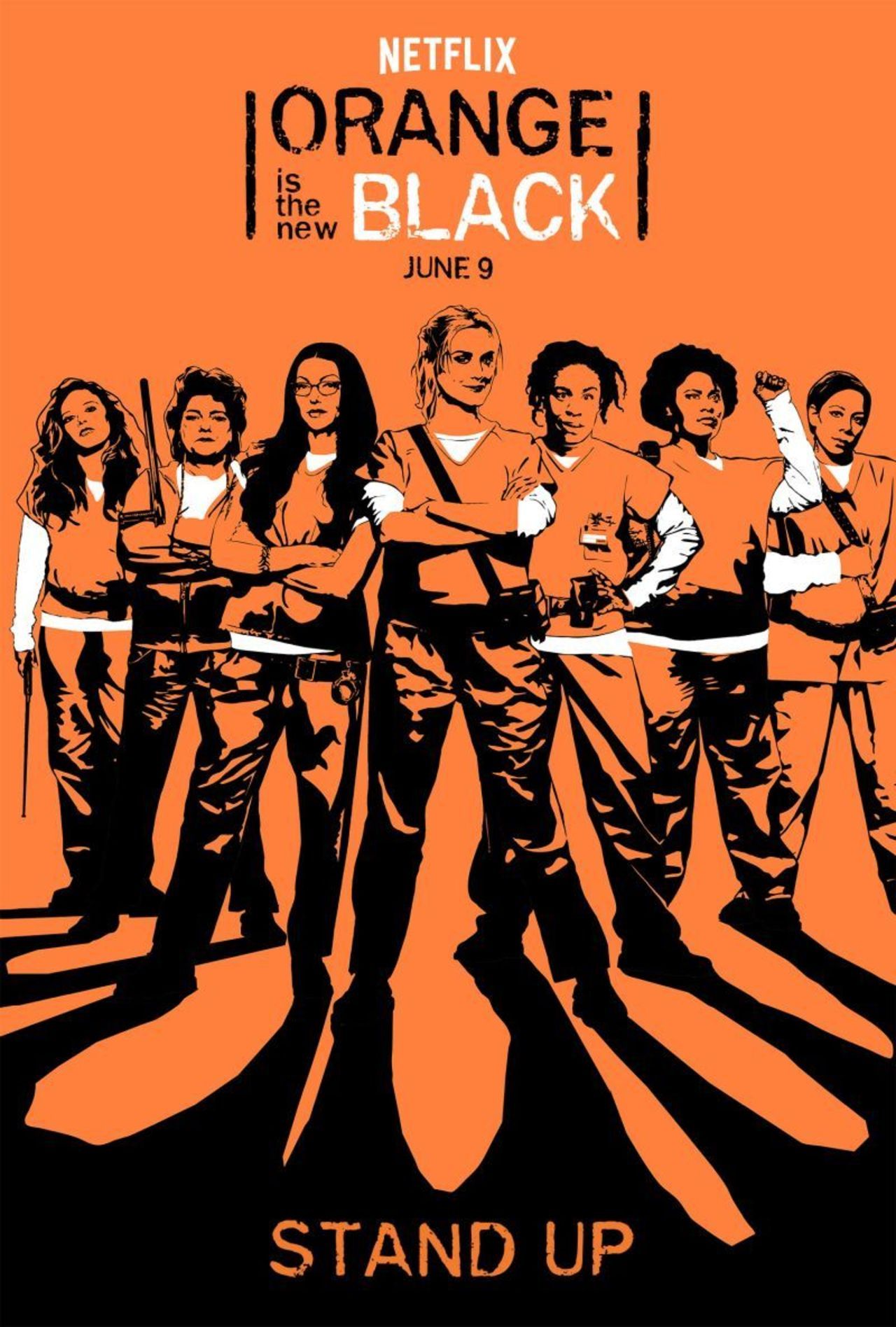
Among the more surprising things about season five of Orange Is The New Black is that it proves that even a show like this otherwise riveting Netflix series can squander momentum. The well-received fourth season managed to weave an even more intricate web of stories, only dropping a few stitches here and there. Viewers were divided after the penultimate episode, but whether you saw injustice or tragedy in Poussey’s final moments, a fuse had been lit. The frustration brought on by dehumanization came to a head, and even though it was cut with plenty of levity, that batch of episodes marked a turning point for the overall story. Season five dutifully tries to stoke that fire in its first half, but just ends up stifling its ambitions with clutter.
Jenji Kohan’s dramedy wrapped its fourth season with a cliffhanger, which is right where we pick up in the overstuffed premiere—the series’ weakest opener ever—and where we stay throughout the first half of season five. The show is successful in building suspense early on; as she holds a gun on the cruel Humphrey (Michael Torpey), it’s anyone’s guess what Daya (Dascha Polanco) will actually do with it. Although OITNB resolves that particular standoff sooner than later, the uncertainty lingers, and the protest-turned-riot becomes the framing device for at least the first six episodes.
This mostly feels like a narrative choice, but there’s also the sense that the writers wanted to stick with the aftermath of Bayley’s (Alan Aisenberg) actions given the public response. Warden Caputo (Nick Sandow) might have failed Poussey, but her friends won’t. But it’s when OITNB tries to imagine where they all go from there that the tonal missteps begin. Led by Taystee (Danielle Brooks), the black inmates’ efforts to expose the wrongdoings at the prison are too often interrupted with cartoonish shenanigans. A poignant speech gets a scatalogical chaser, which would be business as usual in previous seasons. This is a show that has usually been able to have both, the pathos and the humor, but for once, OITNB ’s earnestness and zaniness work against each other.
Having so many moving parts isn’t anything new to the OITNB writers, but they also struggle with doing right by the huge cast more than ever. It’s the first time we can really see the hamster wheels turning, as they race to recontextualize everyone from Piper (Taylor Schilling) to Gloria (Selenis Leyva), now that Caputo and the Management & Correction Corporation have been deposed. There are disparate factions and near-daily coup attempts, which is impressive considering the whole season takes place over a three-day timeframe. Though they were united in the cafeteria following Poussey’s death, many of the inmates are still looking out for their own best interests, including acquiring some coveted snacks. Litchfield might be divided against itself, but the series still features plenty of slice-of-prison-life moments, like raiding the kitchen for makeup supplies or whipping up a homemade vibrator.
Despite the chaotic start, the new season mostly upholds the series’ honest, humorous look at the prison populace. Even the more absurd moments, like a high-stakes game of “Fuck, Marry, Kill,” reveal just how much optimism there still is in these cinder-block walls, as well as how fluid priorities can be. That’s when OITNB regains its stride and balances the lighter elements with the heavier ones, like just what it is Taystee et al. really expect to get out of all of this. But there’s just so much going on in episodes like “Riot FOMO”—which, naturally, is what Piper is afflicted with—that these newly discovered motivations don’t always take hold.
Less deserving arcs end up getting a more in-depth treatment, as we spend far more time with Piper and Alex (Laura Prepon) than is warranted anymore. Piper’s long since outlived her usefulness as a way in for viewers, but her attempts to benefit from the uprising still get plenty of screen time, to dubious effect. This is just Piper being Piper, but that realization just underscores what a missed opportunity it is to drive home that point once more. Orange Is The New Black says it wants a revolution, but it fails to back that talk up in its execution.
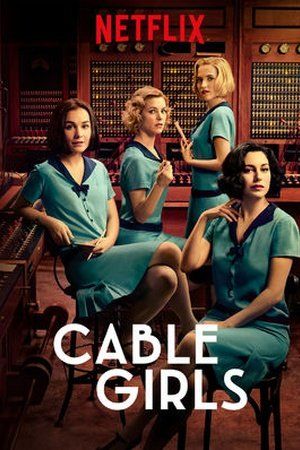
Set in the glamour of 1920’s Madrid, Netflix original Cable Girls easily pulls the audience in. The show is centred around the con woman Alba Romerio (Blanca Suarez). Alba plans a heist to rob the Telephone company, and to off the detective who is blackmailing her after the murder of her friend Gimena. While there she learns one of the directors of the company is her ex-lover who she was separated from ten years earlier. But in order to pay off the detective she must get close to the son of the founder, Carlos (Martiño Rivas). The ensuing story follows her and her friends as they navigate sexist divorce laws, custody battles, tyrannical fathers, and the bloom of a shy first love all while she navigates her double life and her growing feelings for her mark.
The background of the plot follows the struggle for women’s rights in Spain and the juicy love triangle between Alba and married ex-lover and her mark who she slowly begins to fall for. The show was originally done in Spanish and has been translated to English. The raw intrigue of plot and the lovability of the characters manage to shine through despite the language barrier. Cable Girls is centred around four women from diversely different backgrounds that bond over their mutual struggles and ensuing friendship.
The open dialogue between the girls shows the slow forming bond. Friendship between the four is reflected by the rise of women’s rights in Spain (and the world). The intense relationship between them is expertly portrayed by the cast. Despite the language barrier English audiences can still relate to their struggles. We can see the universal struggle of women determined to have successful home and work lives. The performance by Blanca Suarez, who plays the anti-heroine Alba Romerio AKA Lydia Agulier captivates audiences with her ability to portray Alba’s façade as nice girl Lydia while maintaining her darker and misunderstood underbelly as con woman Alba. Her cast mates deliver similarly spectacular performances. Ana Fernandex who plays willful suffragette Carlota, is trying to escape the crushing tyranny of her father, the admiral. The development of these two as well as Angeles (Maggie Civantos), the abused workaholic mother, and Marga (Nadia de Santiago), the socially anxious girl who falls in love, creates a truly intoxicating story-line. Cable Girls’ script pushes the plot farther and farther throughout the eight-episode season. While some characters might seem a little flat, as a whole the show manages to depict the multifaceted nature of being a woman, especially in the age of suffrage. And the intrigue displayed by the character development of Alba and the far-fetched yet exhilarating plot make me certain we can expect a more in depth look at supporting characters Angeles, Carlota and Marga in the upcoming second season.
The script while overtly dramatic, is incredibly entertaining. Around every corner there seems to be a new twist, a murder, a heist, a secret affair. The writers have truly taken the idea of the roaring twenties and brought it to life. Whether it is the coup d’etat against Spain’s monarchy or the invention of the rotary telephone, the girls are consistently up against some seriously stacked odds. The inclusion of major plot points that are intertwined with the issues of the twenties, mainly marriage laws and the limited options of women, gives a fresh look at the incredible pitfalls of a glamourized age.
However, the love triangle between Francisco, Carlos and Alba seems somewhat played out given the incredible rise of love triangles in popular youth culture of today. The rise of Twilight , Sex and the City , Vampire Diaries, and One Tree Hill can be attributed to this popular trope in television. But Cable Girls still manages to interest its audience. All of these shows hinge on the intoxicating drama of a forbidden love triangle. This is the immediate hook of Cable Girls: will Alba choose her past love, the forbidden romance with responsible Francisco; or his best friend and brother in law Carlos who can offer her romance and the life she has always wanted. But as you delve deeper and deeper into the series, Alba’s love life comes second to the bond she feels with her friends and her desire to be a better person. Her twisted sense of morality after being raised by Victoria, a Madame of a brothel, creates a war within herself as she struggles to do the right thing. The incredible journey of Alba’s character development makes her a powerful protagonist.
Cable Girls is an intriguing show. The development of interconnected friendships perpetrated by the script brings together four unlikely friends who work together to overcome the problems of the age. And while it may appear that Alba is being forced to choose between two men, the true question is her decision between the confines of her relationships with Carlos and Francisco, and the freedom and independence of her friendship with her fellow cable girls.
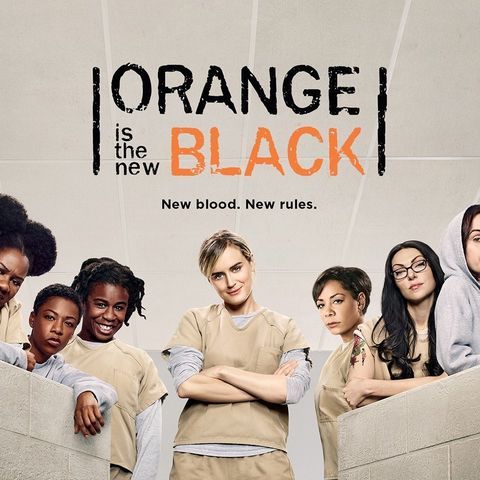
One year after it was ruled ineligible to compete as a comedy by the Emmys, Orange is the New Black returns to Netflix with its most effectively wrenching and dramatic season to date, laced with poignant social commentary that's deftly woven into the story. Naturally, there are still plenty of moments of levity, but you'll find the bottom quickly drops out in Season 4 more than ever before. Things that start as amusing tales quickly turn sour and sad and once again the series excels at utilizing its (ever-growing) ensemble of players.
Piper Chapman (Taylor Schilling) , no longer the central character (and it's been this way for a few years), kicks off the season with the weakest initial arc of the bunch. Played for light laughs, Chapman's attempt to appear intimidating in front of her fellow inmates, piggybacking off what she did to Stella in Season 3, scarily snowballs in unexpected ways. So what begins as a weak attempt at quirkiness balloons into something quite frightening. Because, like the series has gone to great lengths to show us, everyone inside Litchfield has a different story and other things going on. So Chapman's flippant appeal to become "gangsta" brushes up against some other characters who - finely put - have their own s*** going on. And it doesn't go well for anyone involved.
Racial tension and privatized prisons become a big issue this season as a hundred new inmates are shoved into the already crowded correctional facility, creating stress and stain among the prisoners and the guards. Yes, MCC - the company that now runs Litchfield - was a big story element in Season 3, but this year the ugliness really comes out. With an abject contempt for human life, the company manages to separate Joe Caputo (Nick Sandow) from the day-to-day work of looking after things on a ground level while also stroking his ego. And in the wake, there's tragedy. And pretty much everyone gets a spoonful or more.
Picking up right where things left off in Season 3, with the mass prisoner exodus/lake party, the events with Alex Vause in the shed majorly effect the season as a whole. And similarly to the way Chapman's Season 4 arc begins, the shed crisis, which I won't spoil here, also manages to inform the rest of the season from an opposite angle. Then, basically, two massively hurdling snowballs wind up colliding in an endgame that hits you like a punch to the stomach.
There are new faces this season, of course. Most notable though is Judy King (Fringe's Blair Brown), who is, ostensibly, a Martha Stewart-style surrogate. But because this is a great show, King winds up becoming so much more than than just a caricature or a stand-in. It's also from her that we get the most comedy this year, since everyone else basically round-robins with one another in a tragedy tournament. King also brings us one of the most fun pairings from the season - that of her and prison electric Luschek (Matt Peters).
And speaking of pairs - King and Yoga Jones (Constance Shulman) also make quite a duo. Along with the touching and unexpected bonding between Counselor Healy (Michael J. Harney) and Lori Petty's Lolly Whitehill. Because this show has a such a large group, not everyone gets their time in the sun in a given season. There are the top players, sure, but then everyone else sort of takes turns with big present day moments and flashbacks. But, rest assured, everyone gets something. It might even take until the very end of the season, but everyone gets something that helps them stand out.
Yes, the show still does flashbacks really well. And what I like about them is that not only do they not solely focus on inmates, but the ones that do focus on inmates don't necessarily show you how that person wound up in prison. Not all of them are "Well, here's the crime that this person did." Some are just meaningful slice-of-life stories and that, in itself, works to give us better characters and show us that these women are more than just the gimmicky crimes they committed.
Despite the witticisms and banter, and occasional moments of slapstick, this is a sad show. And an especially crushing season. It's overflowing with heartache as it churns out expert tales focusing on love, death, mental illness, rape, cruelty, dehumanization, racism, hate, and greed. And only right at the very beginning of the season did things feel somewhat disposable. But, as mentioned, everything builds into something else because almost nothing in Litchfield can exist in a vacuum.
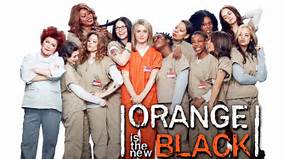
There's bittersweet irony behind the Emmys announcing their new criteria for what can be nominated as/considered a "comedy" (nothing that runs over 30 minutes) the same year Orange is the New Black delivered unto us its lightest, funniest season to date. Not that pathos wasn't present, there was just less of it. There were dark turns in Season 3 , assuredly, but nothing to match Season 2's seasonal villainess Vee and the cruel beatings she wrought. In fact, most of the shocks this year came right at the beginning of the season and then later in the season finale - leaving the most of the middle for fun and enjoyable ensemble euphoria.
Alex returning to Litchfield, and to Piper (as she'd plotted), played out as the initial focus of Season 3. And while it seemed like Chapman and the emotionally-crumbling Vause were steering us toward tragedy, misfortune unexpectedly struck elsewhere, thinning the Litchfield herd in very significant ways. Yes, Orange is the New Black can sometimes pluck obvious strings, play easy notes, and be a touch on-the-nose, but there are other aspects of the series that demonstrate how much it truly deviates from a lot of established TV norms and tropes. Often in admirably wrenching ways.
So once the first three episodes were over and the dust had settled a bit, Season 3 entered into its main through line which was the corporate takeover/salvation of Litchfield. From there, much of the show became about the inmates, guards, and Caputo reacting to new budget cutbacks and a general overall bureaucratic ignorance about prison life. Moreover, an actual across-the-board contempt for the human element of prison rehabilitation in favor of turning a profit. Lichfield's new corporate overlords simply don't care about living conditions, job training, or prisoners bettering themselves in any way. They just move from quarterly stockholder meeting to quarterly stockholder meeting hoping the numbers please investors.
Which brings me to this season's "Vee," if you will. That being glassy-eyed comedian Mike Birbiglia's Danny. Not a villain per se, but Litchfield's on site corporate rep. A people-pleasing, non-confrontational dope who becomes the confusing bane of Caputo's existence. Danny's not a malevolent force, merely the representation of big business backpedaling and doublespeak. He also rarely looks anyone in the eyes when he converses with them, which I'm not sure is purposefully or just Birbiglia's performance style. Either way, it works.
Speaking of Caputo, Sir Sideboob got a lot of attention this year. As a well-intending man with a lot of appeasing and plate spinning to do, his quest to "save" Litchfield wound up gloriously swallowing him whole. He even got his own series of flashbacks, detailing the many times he got crapped on for attempting to do right thing. But he wasn't the only fresh face in the flashback game.
Sure, we got some more time with flashback vets Alex, Nicky, and Pennsatucky, but we also spent a spell, for the first time, with Big Boo, Bennett, Leanne, Flaca, Aleida (though she appeared previously in Daya's flashback), and the quiet/silent Chang and Norma. Every season, this series seems to embrace its ensemble qualities a bit more and it's phenomenal. At this point, there's hardly anyone on the series that I don't care about in some form or another. To varying degrees, sure, but that's still a remarkable feat.
Many of the other major seasonal stories stemmed directly from the corporate arc, most notably Piper's behind-bars-enterprise born of the newly built panty-sewing seamstress wing and several inmates attempt to request Kosher meals after the big business overlords bring in boil-in-a-bag slop for everyone to eat. It's Piper's storyline that hits the high notes though.
Because whereas last season sublimely realized that Piper was no longer the main character, or an audience surrogate, and blended her into the ensemble, Season 3 seemed to more fully embrace the fact that she's a spectacularly selfish and manipulative person. A young woman perhaps perfectly suited for prison life. Breaking Bad even gets mentioned at one point during Piper's expansion of her criminal enterprise of well-worn unmentionables.
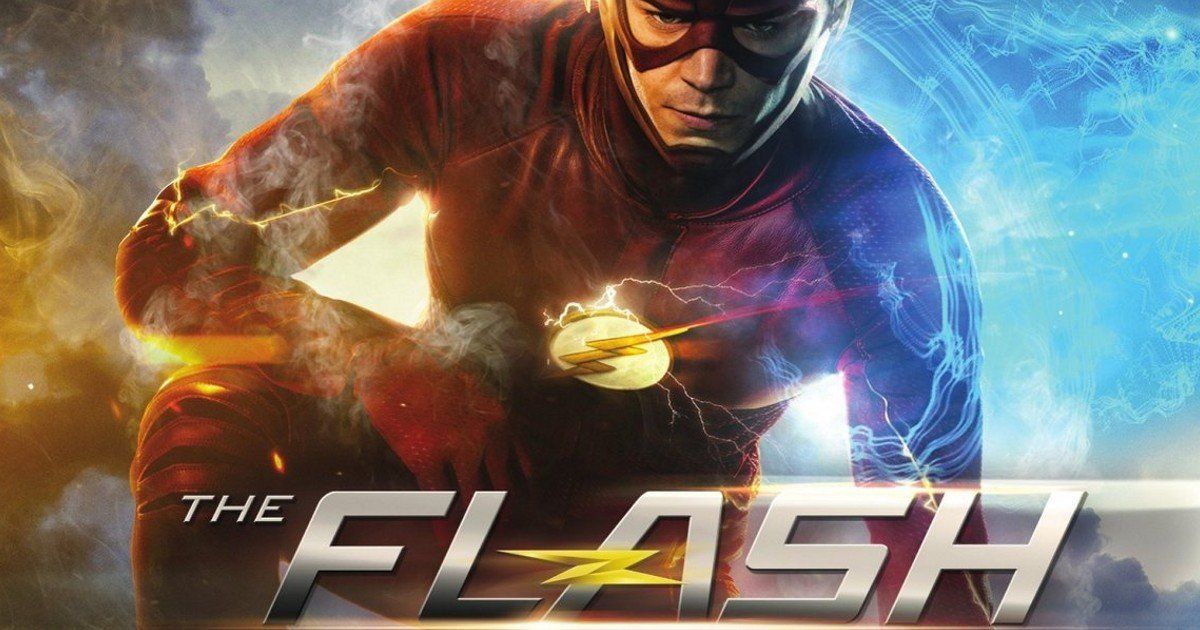
While the fourth season of "Arrow" was fighting a losing battle to keep viewers entertained, CW's other DC offering, "Flash" was leaving a strong sense of deja-vu on viewers with a sophomore season that really upped the ante in terms of storytelling, following a shaky, but overall, entertaining debut season. While the first season of "Flash" didn't necessarily wow me, it had its fair share of shocking plot twists and more surprisingly moments of heart and emotion that "Arrow" had never really touched on. Tying action, drama, and suspense together was an earnest, natural sense of humor led in no small part by series star Grant Gustin. Gustin's Barry Allen, despite all the growing pains of a new series, was a hero we wanted to see win and a more importantly a hero anyone could feel proud to cheer on.
The second season of "Flash" accomplishes a great number of things over its 23-episode run. First and foremost, it actually follows up on its previous season cliffhanger quite nicely, before throwing viewers a curveball by introducing the concept of the multiverse in the CW DC universe. If Gustin's Barry Allen weren't a great enough character, viewers are treated to a Golden Age throwback in the form of Teddy Sears' Jay Garrick, a direct riff on his comic book counterpart and The Flash of Earth-2. The introduction of the multiverse allows the showrunners to mix up the narrative by bringing back Harrison Wells as his own Earth-2 counterpart, leaving viewers guessing for quite some time if this Wells is as sinister as his first season counterpart. Suspicion abounds naturally when another Reverse Flash-esque villain takes the mantle of season two's big bad; Zoom is a force of nature throughout the entire season and his presence is felt even when he doesn't have a direct hand in the proceedings. Tony Todd deserves a hearty dose of praise for the thankless role of voice actor, who instills dread in characters on-screen and viewers off.
While the idea of a multiverse is a tantalizing enough idea, its main purpose is to introduce a whole new batch of metahumans to the fray as well as find ways to bring back fan favorites Gorilla Grodd, Trickster (Mark Hamill returning to play the same role he played in the early 90s incarnation of the series!), Killer Frost, and the curve ball stinger King Shark whose baffling appearance was such a hit, he was brought back for his own standalone episode. While Flash's trademark Rogues Gallery does have a prominent role in this season as the season prior, Flash's allies get to take center stage, most notably Cisco's metamorphosis into his comic book counterpart Vibe and relationship with Kendra Saunders that helps set up part of a crossover event with "Arrow" establishing the "Legends of Tomorrow" series. To say season two is a packed affair is a huge understatement, but fortunately, showrunners Berlanti and Kreisberg keep things on steady ground throughout and there's not a single solitary episode or moment for that matter that would make a fan question whether season two will deliver a satisfying finale.
While "Arrow" fans might malign that series' tendency to spend entire episodes or multiple episodes for that matter laying out exposition and bloated futile character development, "Flash" manages on more than one occasion to fill an episode with character drive drama with just enough action to remind us this is a superhero show. The drama works though and the performances of the entire cast: most notably Gustin, Tom Cavanagh, and Jesse L. Martin elevate "Flash" from your run-of-the-mill weekly superhero actioner to an honest-to-goodness action drama that viewers can continue to feel invested in. On paper, "Flash" would seem corny and saccharine (his Rogues Gallery alone can elicit an eye roll), but in execution, "Flash" is a refreshing change of pace from the normally dour tone that permeates the DC Universe.
In the end, "Flash" sticks the landing with a finale that leaves viewers wanting more and perhaps wiping a tear or two from their eyes. There's not a single plotline earning more than an episode's worth of attention that doesn't come together in a cohesive fashion and just when you think the series couldn't blow your mind with another major plot twist, "Flash" does just that. It sounds cliche, but is truly impossible to discuss the final 25% of the season without giving away some huge plot details, but trust me when I say "Flash" will leave you speechless at multiple times over the season. More importantly though, season two is a near perfect piece of superhero storytelling and the only CW DC show to date that I've looked forward to revisiting from start to finish. Season two of "Flash" is right on part with season two of "Arrow" although with an entirely different tone. Season three of "Flash" has just begun at the time of this review and I can safely say, the payoff from season two is already being realized in a satisfying fashion. To make a long story short, season two of "Flash" is just a damn good show.

As entertaining, well written and acted as any superhero movie in multiplexes this year, The Flash is another winner from DC Comics and The CW. One of the few major superheroes without a feature-length movie, The Flash instead receives 23 excellent, hour-long television episodes. Barry Allen (Grant Gustin) works as a forensic investigator for the Central City Police Department, alongside Detective Joe West (Jesse L. Martin), the man who raised Barry after his father was jailed for killing his mother. Barry pines for West's daughter, Iris (Candice Patton), but remains squarely in the friend zone. Local scientist Dr. Harrison Wells (Tom Cavanagh) activates a giant particle collider but it implodes, sending a storm cloud of energy across Central City. This energy destroys Harrison's S.T.A.R. Labs and catches an unsuspecting Barry at home. He ends up in a nine-month coma, but, when he awakens, he can move faster - much, much faster. Barry joins Wells as he works to understand what happened to Barry's body, and Barry begins fighting crime across Central City. He is soon dubbed "The Flash" and attracts the attention of local criminals, many of whom were also unnaturally effected by the rogue energy.
The Flash is an upbeat, quickly paced hour of television, and the writers do a remarkable job introducing interesting characters and villains. The show's two biggest assets are Gustin and Martin, who make for an effective if unconventional team. Barry at first hides his abilities from Joe, but is forced to reveal his identity when Iris is threatened. The Flash has deep meaning for Barry and Joe: The night Barry's mom (Michelle Harrison) was murdered there was a super-fast man in a yellow suit in the room. Barry knows his dad, Henry Allen (John Wesley Shipp), is innocent, but was never able to prove it. Even Joe thought Henry was guilty until Barry reveals his gift. Exonerating Henry Allen is a recurring plot point, and the show integrates it nicely with the immediate, weekly villain action. Most of the villains are "metahumans" like Barry, and some, like Wentworth Miller's Captain Cold and Dominic Purcell's Heat Wave, return in multiple episodes.
While this show piggybacks on the success of Arrow , you don't have to be caught up on that show to enjoy The Flash . There are several crossover episodes, and Oliver Queen (Stephen Amell) and Felicity Smoak (Emily Bett Rickards) join Barry in Central City to fight crime, much to Queen's chagrin. I haven't seen Arrow , but this collaboration piqued my interest. Alongside good-natured Gustin are Danielle Panabaker and Carlos Valdes, playing S.T.A.R. Labs employees Dr. Caitlin Snow and Cisco Ramon, respectively. Rick Cosnett plays Eddie Thawne, a new CCPD officer who begins dating Iris. The Flash integrates a lot of elements - romance, comedy, action, science fiction - into one show, and it does so without overloading the circuits. Barry and Iris's friendship/unrequited love could have been an annoying distraction from the action, but it ends up as quite the opposite. This is due, again, to Gustin and Patton, who have great chemistry.
The first season throws a lot at you, and ends with some key questions unanswered. Barry has a lot on his plate: the woes of a young professional, a turbulent love life, and a tremendous responsibility to serve the citizens of Central City. The show's endearing characters and upbeat tone make for great entertainment, and I was hooked from the first episode to the twenty-third. The production design is theatrical quality, the effects are impressive, and the show is consistently well edited and acted. An unrelated film is coming in 2018, but I am more than happy to rejoin this cast for Season Two on the small screen. The Flash is a quality hour of television, and is more than just another superhero adventure.
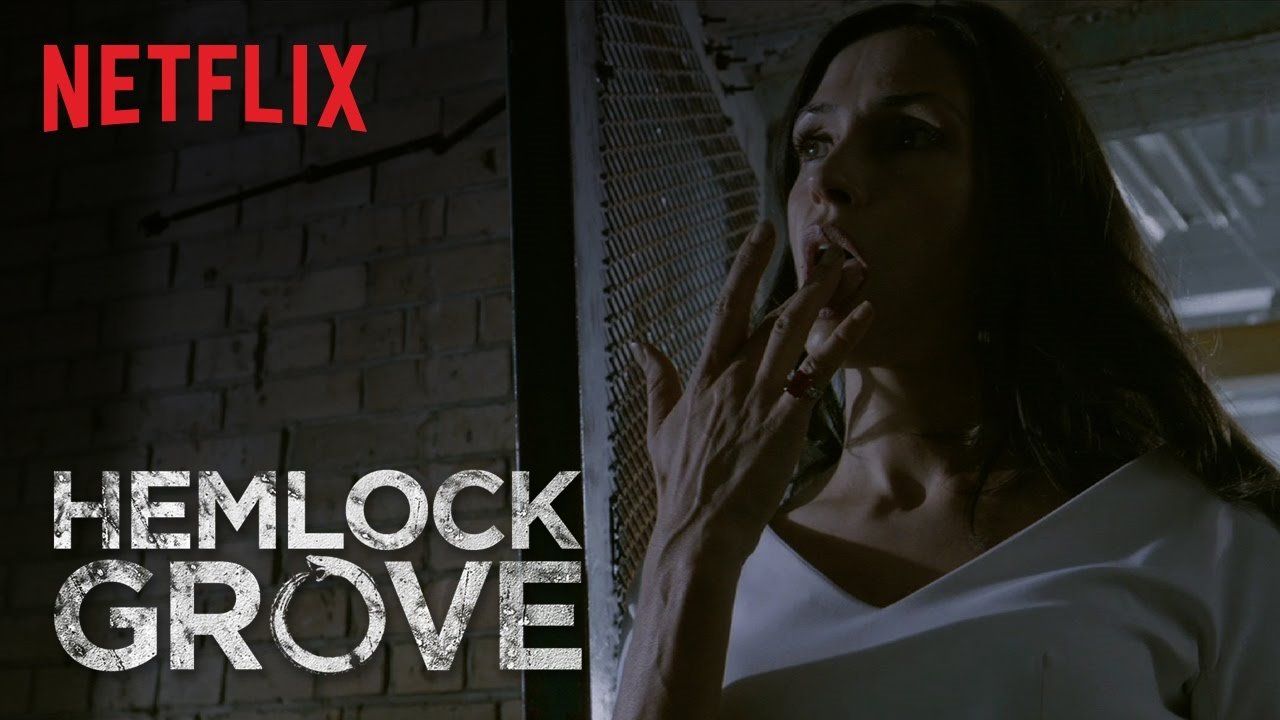
This show is having an identity crisis. The Eli Roth-produced Hemlock Grove cannot decide whether it wants to be an intense, adult-oriented horror show or a teen-baiting sci-fi romance. There are werewolves and monsters and death - Oh My! - but season one is a hot mess. Plot threads dangle and get snipped in the unsteady narrative, and I finished the season not entirely sure what I had seen. Famke Janssen fervently chews the scenery as Olivia, the matriarch of the powerful Godfrey family that runs a small Pennsylvania town. Olivia's son Roman (Bill Skarsgard) and his Gypsie friend Peter (Landon Liboiron) search for the beast that has murdered a number of townsfolk, and themselves are implicated in the crimes. Parts of the show are fascinating, others are downright terrible. Between bursts of excitement I found stretches of interminable wandering and terrible dialogue. The show's seams are showing, and the whole murky affair threatens to combust.
Netflix charged into the television arena with House of Cards and Orange is the New Black , and Hemlock Grove feels like a natural complement to round out their genre wheelhouse. I do not mind the show using fantastical creatures, but calling the mythology here muddy is an understatement. The Godfrey family is a shady bunch with a complicated past. The town's Godfrey Institute is a phallic palace of medical mystery, and Olivia is the Queen Bitch of Hemlock Grove. She cavorts with her dead husband's brother, Dr. Norman Godfrey (Dougray Scott), while raising entitled rebel Roman and his deformed but insightful sister Shelley (Madeleine Martin). Roman and Peter form an uneasy bond to clear their own names, and discover that each holds relevant and surprising secrets.
I think Hemlock Grove may have gotten away from the writers a bit despite its basis in Brian McGreevy's novel. The show goes down so many paths that it gets lost. There are few, if any, plot threads that are appropriately concluded. Characters like Clementine Chasseur (Kandyse McClure), a Wildlife officer investigating the killings, are given bizarre backstories that are then largely ignored. The killings actually take a back burner to the Roman and Peter show, which is not complete without existential crises and a melodramatic battle over Roman's annoying cousin Letha (Penelope Mitchell). Skarsgard and Liboiron are strong actors, but some of the show's dialogue is appalling. I am not sure whether the writers were trying to be clever, but I ran out of fingers in the first episode when trying to count the show's useless, dead-end conversations. "Make your stomach growl" is something Letha actually says to Peter after sex. Pourquoi?
A TV series is given some license to carry plot elements over to its next season. I was not expecting a full resolution in this first season, but the show poses questions simply for the sake of confusing the audience. Shelley is the show's most interesting character. Unwanted at birth by her mother and prone to literally lighting up when emotional, Shelley is obviously a significant player in this story. It is too bad my interest in seeing the next season is minimal. Maybe her destiny will be revealed. Janssen's vulgar accent is actually a clever trick. At least I think it is. One early scene hints that Olivia puts on the haughty tongue as part of her staged rich-bitch act. But I'm not entirely sure the show is that clever. By the time the credits rolled in the final episode, I was not sure what to make of all the creature dynasty backstory and Oedipal peddling. The production values are as messy as the narrative, complete with mismatched lighting and rough editing. A train wreck might catch your attention, but you'll probably regret watching when the carnage concludes. You've been warned.
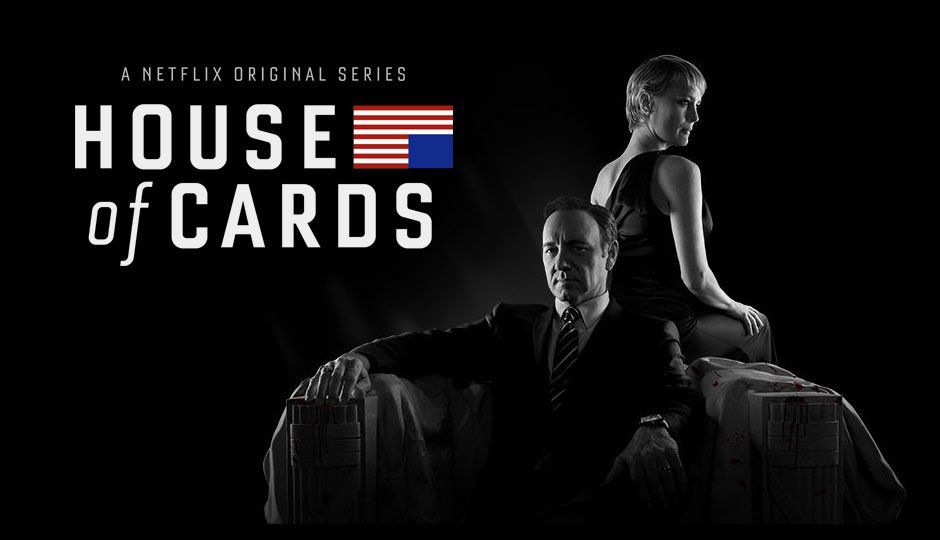
I had kind of equated House Of Cards to a child that a really popular couple I knew may have had, and every weekend after they had the child I was urged to "come see the baby!" So when I learned that I was getting the second season of the show to review, I did some work, specifically watching the first season before poring over the second. Now that I have some time in, let us jump in, shall we?
The show is based on the British show of the same name, the DVD/video streaming service Netflix decided to make the show in an attempt to produce their own content to help business. The show had some big names producing it in Eric Roth ( Munich ), David Fincher ( Zodiac ) and Kevin Spacey ( L.A. Confidential ), the latter of whom was the star, portraying South Carolina Democrat Francis "Frank" Underwood. After a rip-roaring first season, the gang returned for a second, and more shenanigans to follow.
Some spoilers may be touched upon, so try to avert your eyes if need be.
The main characters return for the season, with Underwood undergoing the transition from House Democratic Whip to Vice President in the first season. He finds himself with an ally in the President, three doors down from his office, but also with an occasional thorn in the side in Raymond Tusk (Gerald McRaney, Simon & Simon ), a longtime friend of the president and multibillion dollar executive. Oh, and Frank is trying to get used to the office of Vice President and its burdens. Meanwhile, Frank's wife Claire (Gerald McRaney, Simon & Simon ) not only deals with revelations about herself and her past indiscretions but has an adjustment of her own.
Now personally, not knowing if there was much of a furor around it when it happened, there were events surrounding Zoe Barnes the journalist (Kate Mara, 127 Hours ) where the storytelling decisions seem questionable. Let us put aside the fact not only that Mara's character was somewhat integral to the first season, but also the reasons her character's story changed in the second season so others could step up to the stage. The decision to replace her storyline with one secondary to the point of annoyance is one that seems to have some question. There was a secondary storyline that emerged with Frank's Chief of Staff Doug Stamper (Michael Kelly, Changeling ) and Rachel (Rachel Brosnahan, Beautiful Creatures ), the young woman he not only used for Frank's political gain, but is now trying to anonymously hide from political enemies and the media. When Doug is putting his loyalties solidly behind Frank and perhaps comprising himself in the process, around Rachel he is just…creepy. In addition, Rachel is trying to find some sort of personal footing for herself in the second season as well, and their penultimate scene is an interesting choice. For the potential both characters may have to show the impact politics may have on their lives (sometimes without them knowing it), that it ends on the note it does for the season is baffling.
There are other needless scenes that involve what turn out to be significant members of the season's stories, or ones that are even more prominent. I guess the implication is that everyone bangs everyone else in Washington, regardless of race, gender or income level. It cheapens some of the characters, like the increase in time to Representative Jackie Sharp (Molly Parker, The Road ) or Lucas Goodwin (Sebastian Arcelus, Turtles Forever ) as Zoe's former boyfriend who seemingly turns into a conspiracy theorist as the season wears on.
Perhaps the most frustrating part of House Of Cards ? The show is capable of producing extended, breathtaking moments for its characters and even demonstrates this. "Chapter 17" deals with a defining moment of sorts for Claire and "Chapter 18" finds Frank examining a moment within his family's past, to the point that it may become a future plot point. By no means are these individual moments things that are transcendent, but within the context of the episodes they are in make for compelling viewing, executed flawlessly by Spacey and Wright.
House Of Cards is a good show, looking at the cold, calculating nature of politics and how those who exploit seem to be willing to put themselves in exploitable situations at times. However, that said, the effusive, even hyperbolic praise which surrounds it is a bit much. Sure, folks love the politics and may even love the people-ruining, but from purely a telling stories perspective I find it to be haphazard at best, though I do admit I enjoy the fact that the Underwoods and most everyone around them tend to relish in a dark nihilism that in terms of their comfort level is assuring. However, let us p
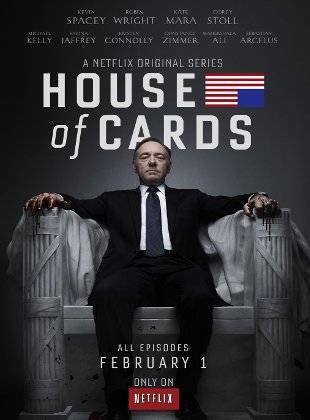
House of Cards debuted entirely on February 1st, 2013 via the Netflix streaming service. It is one of the first shows to ever be featured on a subscription streaming service and to be a big-budget, critically acclaimed creation. It premiered alongside the much-anticipated return of comedy-favorite Arrested Development. The show is an adaptation of both a novel (by the author Michael Dobbs) and a previously created BBC miniseries. The first season had had thirteen episodes of curvy, dark politics within our nation's fictionally-portrayed House of Representatives.
This incarnation was an interesting launch-show attempt by Netflix to branch out into original programming, and programming wizards at Netflix were probably pleased with the high ratings, surely a delight with the involvement of high-profile director David Fincher, and an unexpected success with the contributing involvement of another high-profile (but often critically maligned) filmmaker, Joel Schumacher, who directed many of the best episodes (including one of the few moments of actual humor on the show).
The
series has several central characters that it focuses on
throughout the first season. The main character is Frank Underwood
(Kevin
Spacey), who is a mean-spirited, cruel, and manipulative individual who
wants
to take down his enemies and do anything he can to become a member
residing
within the white house cabinet. He often speaks directly to the
audience, going
over fourth-wall storytelling, and his character is the least likeable
of the
entire cast. However, it definitely is a well-written character that is
impeccably
performed by Kevin Spacey, who is relentlessly scary in the part. Frank
is
aided by a crony of a character with Doug Stamper (Michael Kelly) doing his bidding and working with him on his
various political plans.
Claire Underwood (Robin Wright), who is married to Frank, is the director of the Clean Water Initiative non-profit organization which often involves itself in the same political world which Frank is involved within. She is a similarly interesting character, someone who almost seems level in coldness to Frank, but who has moments in which she seems much more humane in small ways. Nonetheless, her coldness and uncaring attitude towards her employees and her actual organization's success beyond publicity and prestige makes the character another one within a ruthless demeanor.
Frank becomes involved with insider trading during the series, and relays information about the political world to a ambitious (if misguided) reporter Zoe Barnes (Kate Mara), who begins with writing for the Washington Herald before leaving the paper as she reaches for higher and higher successes through her connection to Frank and the stories she has been able to write because the two have paired together. It creates more and more commotion and drama throughout the season, with escalating results in both Frank and Zoe's lives.
Peter
Russo (Corey Stoll) is a congressional representative
who begins to work with Frank after an attempt is made to expose his
alcohol,
drug, and sex addictions. Over the course of the first season, Russo
attempts to
reform himself and begins a campaign to become the governor of
Pennsylvania.
Yet trouble arises, and problems continue to exist for Russo, his
girlfriend Christina
Gallagher (Kristen Connolly), and his children from a previous
marriage. The
downward spiral continues.
The series is one of the darkest, bleakest, and most horrifying series ever made about the U.S. political machine and the (albeit fictional) characters which it portrays as being a part of our everyday political process through representatives and the like. Most of the characters seem shockingly cold, dispassionate, and manipulative. The show is dark, gritty, and without the means to make more characters be a part of the show that the viewer can wholly root for in significant ways it becomes a difficult series to completely get behind with full enthusiasm.
Nonetheless, the writing, directing, and cinematography are excellent examples of growing creativity in television and the way in which the lines are becoming blurred between seeing television and theatrical film productions. This show is more convincing (from a production standpoint, at least) as a high-caliber undertaking than many bid-budget films are in today's landscape of film and television. TV series are becoming more like novelized films, while a standard film is starting to feel more and more like a serialized television episode, as almost every popular production these days seems to indicate to studio executives a "need" for some sequel "magic" to take place.
This isn't one of the best show's around. It's too bleak and depressing to fully become absorbed within it. Yet the performances and production values are undeniably first-rate, and will keep a number of viewers intrigued enough to keep tuning in to see how the political landscape of the House of Representatives can be explored in fictional-form. This isn't a show for everyone, but viewers with a keen sense of politics and who enjoy dark dramatic works might find it to be an interesting television creation the most.
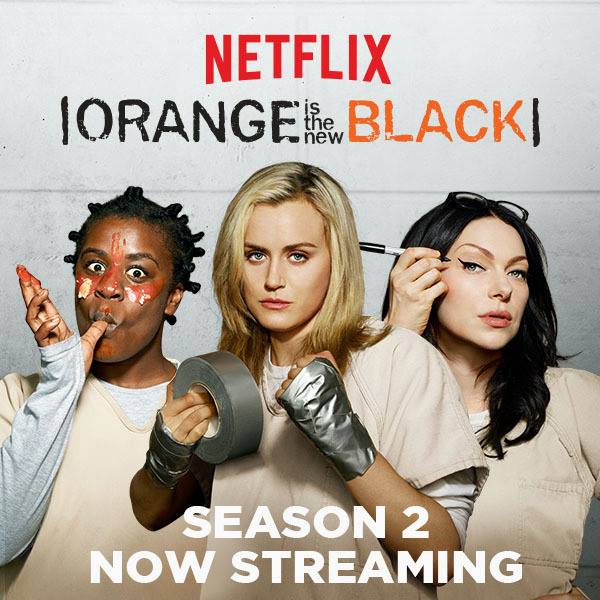
After producing a big hit with House of Cards , Netflix solidified their reign over original streaming content with the surprise success of Orange Is the New Black, a one-hour dramedy about a group of colorful characters in a women's prison. While its first season was being put together, Netflix didn't give as much marketing and budgetary love to Orange Is the New Black the way they did to House of Cards, their David Fincher/Kevin Spacey powerhouse. Loosely based on Piper Kerman's non-fiction book about her time in prison, and created by Weeds ' Jenji Kohan, Orange Is the New Black became as popular as House of Cards thanks to its counterprogramming, and a fresh and natural approach to prison life, one that didn't shy away from the brutal truths as well as the organic comedic situations of life in prison.
After their "little show that could" turned into a mega hit, the writers must have felt the pressure not to disappoint the show's legion of fans, whose dedication was proven by the vast amount of people dressed up as characters from the show for last Halloween. Instead of doubling down and providing the audience with more of the same, Kohan and his writers sought to shake things up by giving more depth to the characters and adding significantly more conflict. Thanks to their daring approach, Orange Is the New Black Season 2 is an improvement on the already impressive first season.
First of all, the writers must have listened to the audience's criticisms regarding the show's proposed protagonist, the entitled white intellectual Piper (Taylor Schilling), for being too whiny and taking up too much of the center stage amongst so many other, frankly more fascinating characters. Season 2 works more like an ensemble show and gives Piper almost equal footing with the other characters as far as screen time is concerned.
This time around, Piper's journey involves a more existential crisis. During the first season, her goal was to survive prison in order to get back to her old life. Her decisions during this season, some of them liberating, some of them destructive, will obviously now affect her life after prison. Instead of setting up a simple love triangle between Piper, her fiancée Larry (Jason Biggs) and her ex Alex (Laura Prepon), the person who got Piper into this mess in the first place, the writers add more depth to this dynamic by introducing a somewhat inevitable series of betrayals into the mix.
The writers could only allow themselves enough space to skim the surface of the vast array of characters during the first season. Most of them were set up as quirky and eccentric, and that was enough for introductions. The second season allows them to gain more depth, as we get more information on their backstories. We get to find out a shocking truth about Lorna (Yael Stone), a colorful and friendly inmate who's obsessed with her fiancée, one that's enough to have the audience revisit the first season for clues regarding her past. Crazy Eyes (Uzo Aduba) was a fan favorite, therefore she gets more space for development this time around. Set up as not much more than comic relief as a crazy inmate during the first season, the tragedy behind his desperate search for love and approval creates the most tender moments of the second season.
The biggest selling point of Season 2 is the introduction of a deliciously twisted villain in the form of Vee (Lorraine Toussaint), a manipulative and narcissistic drug dealer. There's something about movie and TV villains who can use the power of persuasion over the power of a gun. Nurse Ratchett is the first name that comes to mind. Vee's mental hold on Crazy Eyes drives the main conflict of the season as Toussaint, to use a cliché that admittedly fits here, creates a character we love to hate. (MAJOR SPOILER) Even though I thoroughly enjoyed her departure from the show, it's sort of a shame that she won't be back for Season 3, other than possible flashbacks of course.

Among the more surprising things about season five of Orange Is The New Black is that it proves that even a show like this otherwise riveting Netflix series can squander momentum. The well-received fourth season managed to weave an even more intricate web of stories, only dropping a few stitches here and there. Viewers were divided after the penultimate episode, but whether you saw injustice or tragedy in Poussey’s final moments, a fuse had been lit. The frustration brought on by dehumanization came to a head, and even though it was cut with plenty of levity, that batch of episodes marked a turning point for the overall story. Season five dutifully tries to stoke that fire in its first half, but just ends up stifling its ambitions with clutter.
Jenji Kohan’s dramedy wrapped its fourth season with a cliffhanger, which is right where we pick up in the overstuffed premiere—the series’ weakest opener ever—and where we stay throughout the first half of season five. The show is successful in building suspense early on; as she holds a gun on the cruel Humphrey (Michael Torpey), it’s anyone’s guess what Daya (Dascha Polanco) will actually do with it. Although OITNB resolves that particular standoff sooner than later, the uncertainty lingers, and the protest-turned-riot becomes the framing device for at least the first six episodes.
This mostly feels like a narrative choice, but there’s also the sense that the writers wanted to stick with the aftermath of Bayley’s (Alan Aisenberg) actions given the public response. Warden Caputo (Nick Sandow) might have failed Poussey, but her friends won’t. But it’s when OITNB tries to imagine where they all go from there that the tonal missteps begin. Led by Taystee (Danielle Brooks), the black inmates’ efforts to expose the wrongdoings at the prison are too often interrupted with cartoonish shenanigans. A poignant speech gets a scatalogical chaser, which would be business as usual in previous seasons. This is a show that has usually been able to have both, the pathos and the humor, but for once, OITNB ’s earnestness and zaniness work against each other.
Having so many moving parts isn’t anything new to the OITNB writers, but they also struggle with doing right by the huge cast more than ever. It’s the first time we can really see the hamster wheels turning, as they race to recontextualize everyone from Piper (Taylor Schilling) to Gloria (Selenis Leyva), now that Caputo and the Management & Correction Corporation have been deposed. There are disparate factions and near-daily coup attempts, which is impressive considering the whole season takes place over a three-day timeframe. Though they were united in the cafeteria following Poussey’s death, many of the inmates are still looking out for their own best interests, including acquiring some coveted snacks. Litchfield might be divided against itself, but the series still features plenty of slice-of-prison-life moments, like raiding the kitchen for makeup supplies or whipping up a homemade vibrator.
Despite the chaotic start, the new season mostly upholds the series’ honest, humorous look at the prison populace. Even the more absurd moments, like a high-stakes game of “Fuck, Marry, Kill,” reveal just how much optimism there still is in these cinder-block walls, as well as how fluid priorities can be. That’s when OITNB regains its stride and balances the lighter elements with the heavier ones, like just what it is Taystee et al. really expect to get out of all of this. But there’s just so much going on in episodes like “Riot FOMO”—which, naturally, is what Piper is afflicted with—that these newly discovered motivations don’t always take hold.
Less deserving arcs end up getting a more in-depth treatment, as we spend far more time with Piper and Alex (Laura Prepon) than is warranted anymore. Piper’s long since outlived her usefulness as a way in for viewers, but her attempts to benefit from the uprising still get plenty of screen time, to dubious effect. This is just Piper being Piper, but that realization just underscores what a missed opportunity it is to drive home that point once more. Orange Is The New Black says it wants a revolution, but it fails to back that talk up in its execution.

Set in the glamour of 1920’s Madrid, Netflix original Cable Girls easily pulls the audience in. The show is centred around the con woman Alba Romerio (Blanca Suarez). Alba plans a heist to rob the Telephone company, and to off the detective who is blackmailing her after the murder of her friend Gimena. While there she learns one of the directors of the company is her ex-lover who she was separated from ten years earlier. But in order to pay off the detective she must get close to the son of the founder, Carlos (Martiño Rivas). The ensuing story follows her and her friends as they navigate sexist divorce laws, custody battles, tyrannical fathers, and the bloom of a shy first love all while she navigates her double life and her growing feelings for her mark.
The background of the plot follows the struggle for women’s rights in Spain and the juicy love triangle between Alba and married ex-lover and her mark who she slowly begins to fall for. The show was originally done in Spanish and has been translated to English. The raw intrigue of plot and the lovability of the characters manage to shine through despite the language barrier. Cable Girls is centred around four women from diversely different backgrounds that bond over their mutual struggles and ensuing friendship.
The open dialogue between the girls shows the slow forming bond. Friendship between the four is reflected by the rise of women’s rights in Spain (and the world). The intense relationship between them is expertly portrayed by the cast. Despite the language barrier English audiences can still relate to their struggles. We can see the universal struggle of women determined to have successful home and work lives. The performance by Blanca Suarez, who plays the anti-heroine Alba Romerio AKA Lydia Agulier captivates audiences with her ability to portray Alba’s façade as nice girl Lydia while maintaining her darker and misunderstood underbelly as con woman Alba. Her cast mates deliver similarly spectacular performances. Ana Fernandex who plays willful suffragette Carlota, is trying to escape the crushing tyranny of her father, the admiral. The development of these two as well as Angeles (Maggie Civantos), the abused workaholic mother, and Marga (Nadia de Santiago), the socially anxious girl who falls in love, creates a truly intoxicating story-line. Cable Girls’ script pushes the plot farther and farther throughout the eight-episode season. While some characters might seem a little flat, as a whole the show manages to depict the multifaceted nature of being a woman, especially in the age of suffrage. And the intrigue displayed by the character development of Alba and the far-fetched yet exhilarating plot make me certain we can expect a more in depth look at supporting characters Angeles, Carlota and Marga in the upcoming second season.
The script while overtly dramatic, is incredibly entertaining. Around every corner there seems to be a new twist, a murder, a heist, a secret affair. The writers have truly taken the idea of the roaring twenties and brought it to life. Whether it is the coup d’etat against Spain’s monarchy or the invention of the rotary telephone, the girls are consistently up against some seriously stacked odds. The inclusion of major plot points that are intertwined with the issues of the twenties, mainly marriage laws and the limited options of women, gives a fresh look at the incredible pitfalls of a glamourized age.
However, the love triangle between Francisco, Carlos and Alba seems somewhat played out given the incredible rise of love triangles in popular youth culture of today. The rise of Twilight , Sex and the City , Vampire Diaries, and One Tree Hill can be attributed to this popular trope in television. But Cable Girls still manages to interest its audience. All of these shows hinge on the intoxicating drama of a forbidden love triangle. This is the immediate hook of Cable Girls: will Alba choose her past love, the forbidden romance with responsible Francisco; or his best friend and brother in law Carlos who can offer her romance and the life she has always wanted. But as you delve deeper and deeper into the series, Alba’s love life comes second to the bond she feels with her friends and her desire to be a better person. Her twisted sense of morality after being raised by Victoria, a Madame of a brothel, creates a war within herself as she struggles to do the right thing. The incredible journey of Alba’s character development makes her a powerful protagonist.
Cable Girls is an intriguing show. The development of interconnected friendships perpetrated by the script brings together four unlikely friends who work together to overcome the problems of the age. And while it may appear that Alba is being forced to choose between two men, the true question is her decision between the confines of her relationships with Carlos and Francisco, and the freedom and independence of her friendship with her fellow cable girls.

One year after it was ruled ineligible to compete as a comedy by the Emmys, Orange is the New Black returns to Netflix with its most effectively wrenching and dramatic season to date, laced with poignant social commentary that's deftly woven into the story. Naturally, there are still plenty of moments of levity, but you'll find the bottom quickly drops out in Season 4 more than ever before. Things that start as amusing tales quickly turn sour and sad and once again the series excels at utilizing its (ever-growing) ensemble of players.
Piper Chapman (Taylor Schilling) , no longer the central character (and it's been this way for a few years), kicks off the season with the weakest initial arc of the bunch. Played for light laughs, Chapman's attempt to appear intimidating in front of her fellow inmates, piggybacking off what she did to Stella in Season 3, scarily snowballs in unexpected ways. So what begins as a weak attempt at quirkiness balloons into something quite frightening. Because, like the series has gone to great lengths to show us, everyone inside Litchfield has a different story and other things going on. So Chapman's flippant appeal to become "gangsta" brushes up against some other characters who - finely put - have their own s*** going on. And it doesn't go well for anyone involved.
Racial tension and privatized prisons become a big issue this season as a hundred new inmates are shoved into the already crowded correctional facility, creating stress and stain among the prisoners and the guards. Yes, MCC - the company that now runs Litchfield - was a big story element in Season 3, but this year the ugliness really comes out. With an abject contempt for human life, the company manages to separate Joe Caputo (Nick Sandow) from the day-to-day work of looking after things on a ground level while also stroking his ego. And in the wake, there's tragedy. And pretty much everyone gets a spoonful or more.
Picking up right where things left off in Season 3, with the mass prisoner exodus/lake party, the events with Alex Vause in the shed majorly effect the season as a whole. And similarly to the way Chapman's Season 4 arc begins, the shed crisis, which I won't spoil here, also manages to inform the rest of the season from an opposite angle. Then, basically, two massively hurdling snowballs wind up colliding in an endgame that hits you like a punch to the stomach.
There are new faces this season, of course. Most notable though is Judy King (Fringe's Blair Brown), who is, ostensibly, a Martha Stewart-style surrogate. But because this is a great show, King winds up becoming so much more than than just a caricature or a stand-in. It's also from her that we get the most comedy this year, since everyone else basically round-robins with one another in a tragedy tournament. King also brings us one of the most fun pairings from the season - that of her and prison electric Luschek (Matt Peters).
And speaking of pairs - King and Yoga Jones (Constance Shulman) also make quite a duo. Along with the touching and unexpected bonding between Counselor Healy (Michael J. Harney) and Lori Petty's Lolly Whitehill. Because this show has a such a large group, not everyone gets their time in the sun in a given season. There are the top players, sure, but then everyone else sort of takes turns with big present day moments and flashbacks. But, rest assured, everyone gets something. It might even take until the very end of the season, but everyone gets something that helps them stand out.
Yes, the show still does flashbacks really well. And what I like about them is that not only do they not solely focus on inmates, but the ones that do focus on inmates don't necessarily show you how that person wound up in prison. Not all of them are "Well, here's the crime that this person did." Some are just meaningful slice-of-life stories and that, in itself, works to give us better characters and show us that these women are more than just the gimmicky crimes they committed.
Despite the witticisms and banter, and occasional moments of slapstick, this is a sad show. And an especially crushing season. It's overflowing with heartache as it churns out expert tales focusing on love, death, mental illness, rape, cruelty, dehumanization, racism, hate, and greed. And only right at the very beginning of the season did things feel somewhat disposable. But, as mentioned, everything builds into something else because almost nothing in Litchfield can exist in a vacuum.
